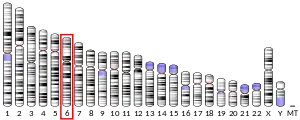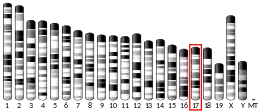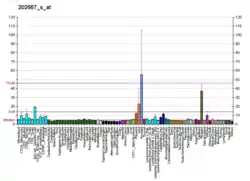| SLC39A7 | |||||||||||||||||||||||||||||||||||||||||||||||||||
|---|---|---|---|---|---|---|---|---|---|---|---|---|---|---|---|---|---|---|---|---|---|---|---|---|---|---|---|---|---|---|---|---|---|---|---|---|---|---|---|---|---|---|---|---|---|---|---|---|---|---|---|
| Identifiers | |||||||||||||||||||||||||||||||||||||||||||||||||||
| Aliases | SLC39A7, D6S115E, D6S2244E, H2-KE4, HKE4, KE4, RING5, ZIP7, solute carrier family 39 member 7, AGM9 | ||||||||||||||||||||||||||||||||||||||||||||||||||
| External IDs | OMIM: 601416 MGI: 95909 HomoloGene: 5072 GeneCards: SLC39A7 | ||||||||||||||||||||||||||||||||||||||||||||||||||
| |||||||||||||||||||||||||||||||||||||||||||||||||||
| |||||||||||||||||||||||||||||||||||||||||||||||||||
| |||||||||||||||||||||||||||||||||||||||||||||||||||
| |||||||||||||||||||||||||||||||||||||||||||||||||||
| |||||||||||||||||||||||||||||||||||||||||||||||||||
| Wikidata | |||||||||||||||||||||||||||||||||||||||||||||||||||
| |||||||||||||||||||||||||||||||||||||||||||||||||||
Zinc transporter SLC39A7 (ZIP7), also known as solute carrier family 39 member 7, is a protein that in humans is encoded by the SLC39A7 gene.[5][6][7] Its fruit fly orthologue is Catsup.
Function
Zinc is an essential cofactor for more than 50 classes of enzymes. It is involved in protein, nucleic acid, carbohydrate, and lipid metabolism, as well as in the control of gene transcription, growth, development, and differentiation. Zinc cannot passively diffuse across cell membranes and requires specific transporters, such as SLC39A7, to enter the cytosol from both the extracellular environment and from intracellular storage compartments.[7]
ZIP7 is a membrane transport protein of the endoplasmic reticulum.[8] Phosphorylation of ZIP7 by casein kinase 2 stimulates the release of zinc ions from the endoplasmic reticulum[9] This provides a signal transduction pathway by which activation of cell surface receptors such as the epidermal growth factor receptor can regulate the activity of downstream phosphatases and kinases.
See also
References
- 1 2 3 ENSG00000229802, ENSG00000226614, ENSG00000112473, ENSG00000206288, ENSG00000224399 GRCh38: Ensembl release 89: ENSG00000227402, ENSG00000229802, ENSG00000226614, ENSG00000112473, ENSG00000206288, ENSG00000224399 - Ensembl, May 2017
- 1 2 3 GRCm38: Ensembl release 89: ENSMUSG00000024327 - Ensembl, May 2017
- ↑ "Human PubMed Reference:". National Center for Biotechnology Information, U.S. National Library of Medicine.
- ↑ "Mouse PubMed Reference:". National Center for Biotechnology Information, U.S. National Library of Medicine.
- ↑ Ando A, Kikuti YY, Shigenari A, Kawata H, Okamoto N, Shiina T, Chen L, Ikemura T, Abe K, Kimura M, Inoko H (Dec 1996). "cDNA cloning of the human homologues of the mouse Ke4 and Ke6 genes at the centromeric end of the human MHC region". Genomics. 35 (3): 600–2. doi:10.1006/geno.1996.0405. PMID 8812499.
- ↑ Hanson IM, Trowsdale J (Aug 1991). "Colinearity of novel genes in the class II regions of the MHC in mouse and human". Immunogenetics. 34 (1): 5–11. doi:10.1007/BF00212306. PMID 1855816. S2CID 30046348.
- 1 2 "Entrez Gene: SLC39A7 solute carrier family 39 (zinc transporter), member 7".
- ↑ Taylor KM, Morgan HE, Johnson A, Nicholson RI (2004). "Structure‒function analysis of HKE4, a member of the new LIV-1 subfamily of zinc transporters". Biochemical Journal. 377 (Pt 1): 131–139. doi:10.1042/BJ20031183. PMC 1223853. PMID 14525538.
- ↑ Taylor KM, Kille P, Hogstrand C (2012). "Protein kinase CK2 opens the gate for zinc signaling". Cell Cycle. 11 (10): 1863–1864. doi:10.4161/cc.20414. PMC 3359116. PMID 22580452.
Further reading
- Maruyama K, Sugano S (1994). "Oligo-capping: a simple method to replace the cap structure of eukaryotic mRNAs with oligoribonucleotides". Gene. 138 (1–2): 171–4. doi:10.1016/0378-1119(94)90802-8. PMID 8125298.
- Suzuki Y, Yoshitomo-Nakagawa K, Maruyama K, et al. (1997). "Construction and characterization of a full length-enriched and a 5'-end-enriched cDNA library". Gene. 200 (1–2): 149–56. doi:10.1016/S0378-1119(97)00411-3. PMID 9373149.
- Strausberg RL, Feingold EA, Grouse LH, et al. (2003). "Generation and initial analysis of more than 15,000 full-length human and mouse cDNA sequences". Proc. Natl. Acad. Sci. U.S.A. 99 (26): 16899–903. Bibcode:2002PNAS...9916899M. doi:10.1073/pnas.242603899. PMC 139241. PMID 12477932.
- Taylor KM, Morgan HE, Johnson A, et al. (2003). "Structure-function analysis of LIV-1, the breast cancer-associated protein that belongs to a new subfamily of zinc transporters". Biochem. J. 375 (Pt 1): 51–9. doi:10.1042/BJ20030478. PMC 1223660. PMID 12839489.
- Taylor KM, Morgan HE, Johnson A, Nicholson RI (2004). "Structure-function analysis of HKE4, a member of the new LIV-1 subfamily of zinc transporters". Biochem. J. 377 (Pt 1): 131–9. doi:10.1042/BJ20031183. PMC 1223853. PMID 14525538.
- Mungall AJ, Palmer SA, Sims SK, et al. (2003). "The DNA sequence and analysis of human chromosome 6". Nature. 425 (6960): 805–11. Bibcode:2003Natur.425..805M. doi:10.1038/nature02055. PMID 14574404.
- Gerhard DS, Wagner L, Feingold EA, et al. (2004). "The Status, Quality, and Expansion of the NIH Full-Length cDNA Project: The Mammalian Gene Collection (MGC)". Genome Res. 14 (10B): 2121–7. doi:10.1101/gr.2596504. PMC 528928. PMID 15489334.
- Huang L, Kirschke CP, Zhang Y, Yu YY (2005). "The ZIP7 gene (Slc39a7) encodes a zinc transporter involved in zinc homeostasis of the Golgi apparatus". J. Biol. Chem. 280 (15): 15456–63. doi:10.1074/jbc.M412188200. PMID 15705588.
- Kim JE, Tannenbaum SR, White FM (2005). "Global phosphoproteome of HT-29 human colon adenocarcinoma cells". J. Proteome Res. 4 (4): 1339–46. doi:10.1021/pr050048h. PMID 16083285.
- Kimura K, Wakamatsu A, Suzuki Y, et al. (2006). "Diversification of transcriptional modulation: Large-scale identification and characterization of putative alternative promoters of human genes". Genome Res. 16 (1): 55–65. doi:10.1101/gr.4039406. PMC 1356129. PMID 16344560.
- Ewing RM, Chu P, Elisma F, et al. (2007). "Large-scale mapping of human protein–protein interactions by mass spectrometry". Mol. Syst. Biol. 3 (1): 89. doi:10.1038/msb4100134. PMC 1847948. PMID 17353931.
This article incorporates text from the United States National Library of Medicine, which is in the public domain.




